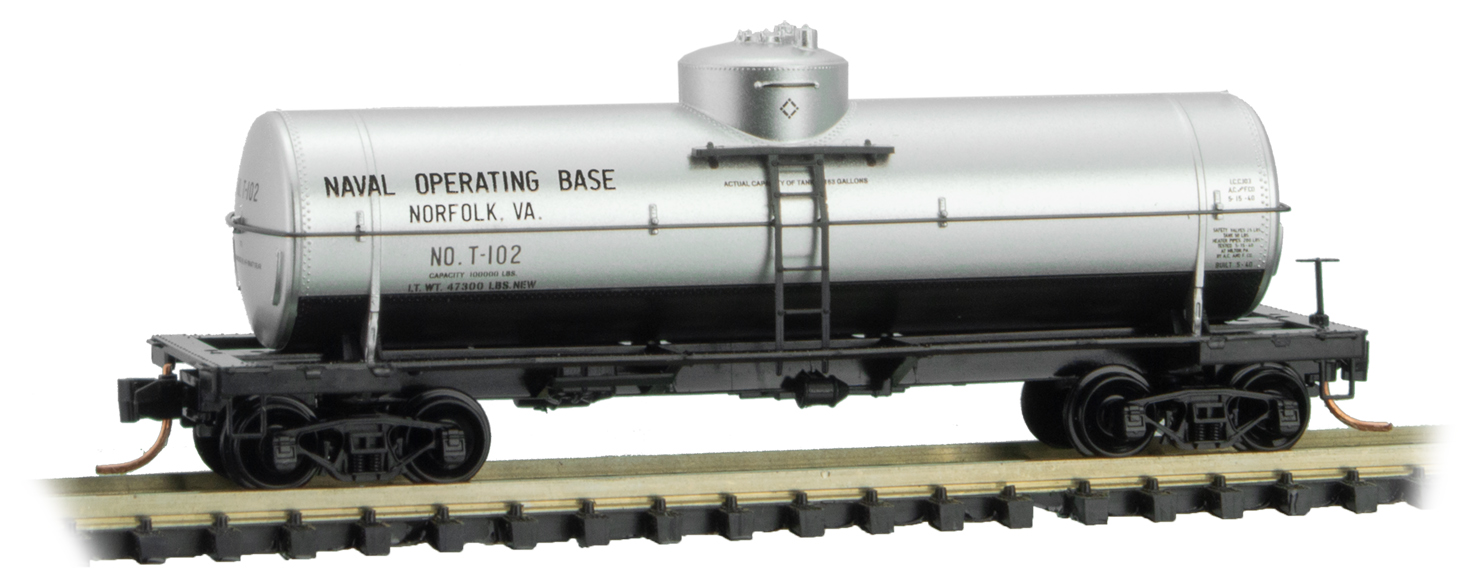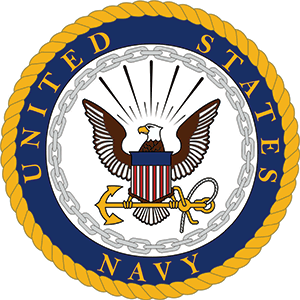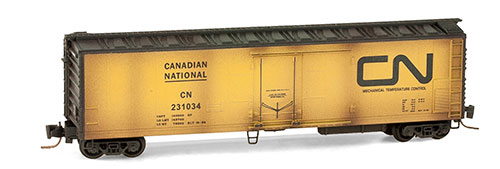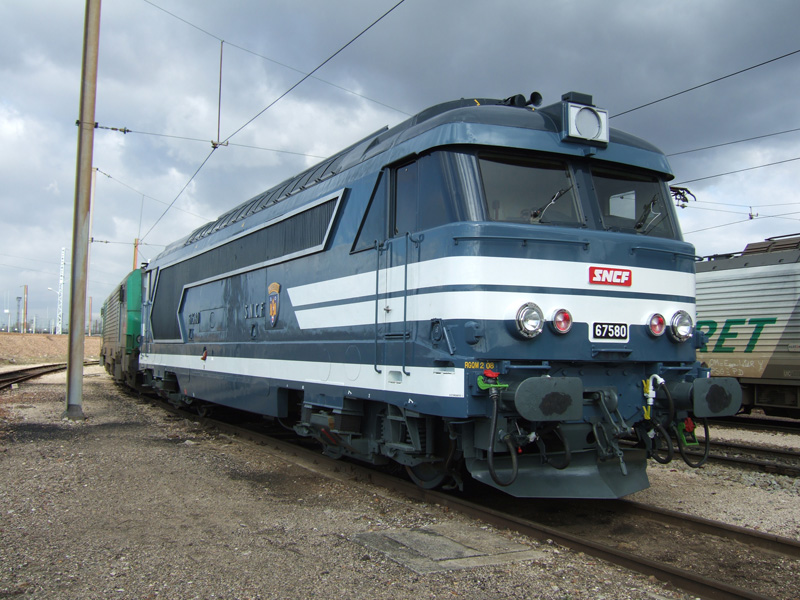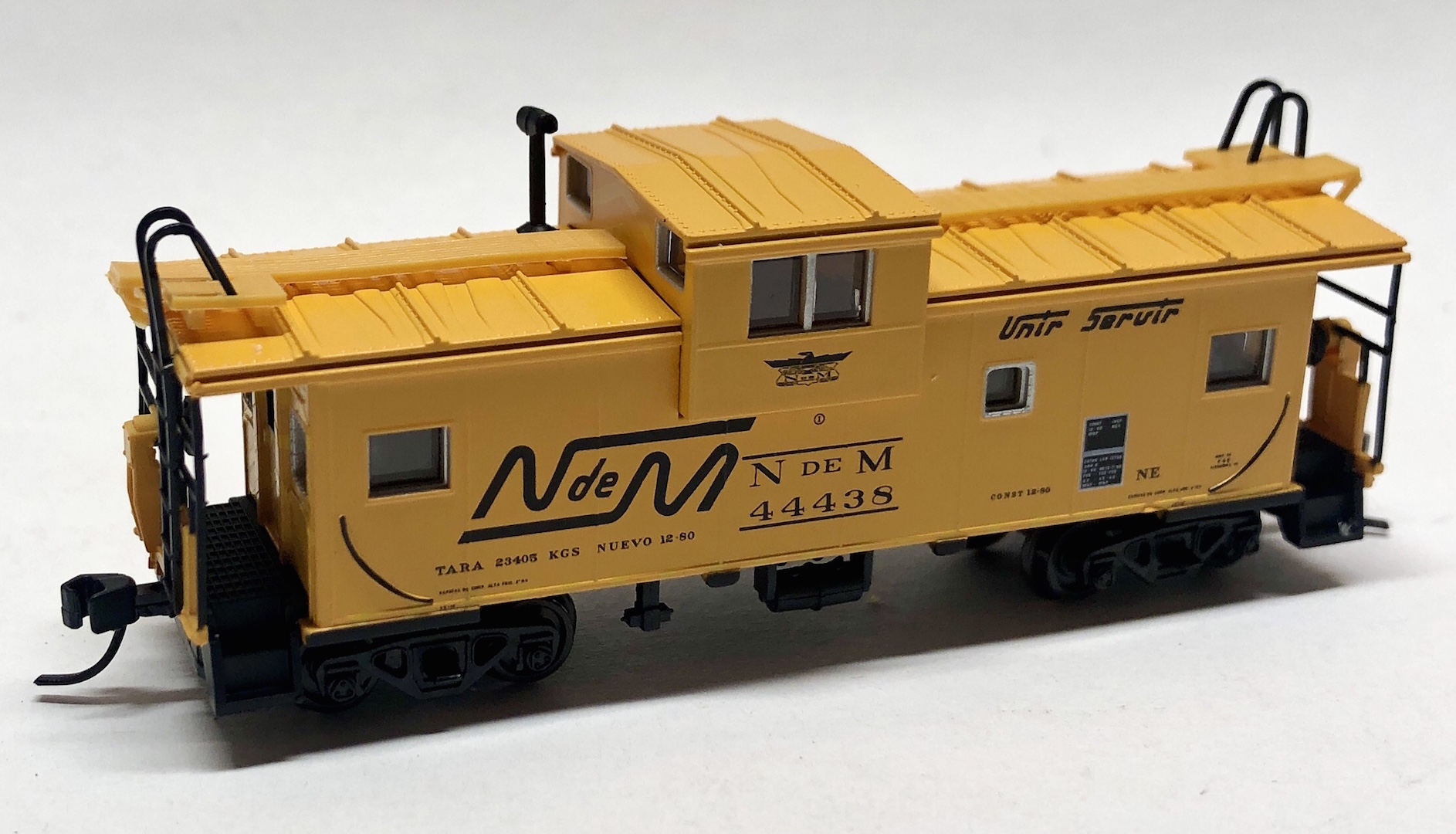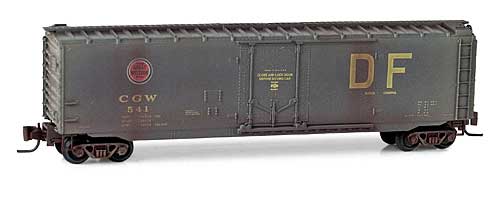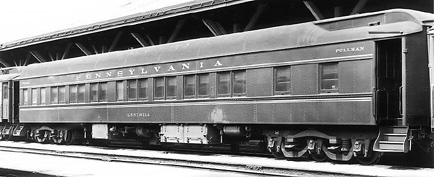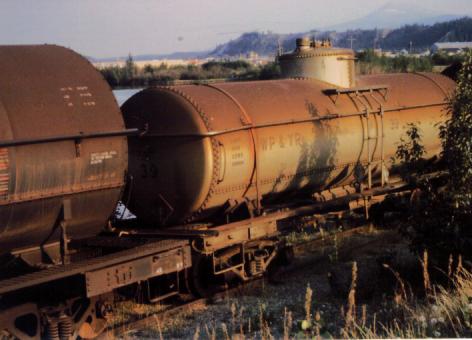Specific Item Information: This 39’ single dome tank car is aluminum with black lettering and runs on Bettendorf trucks. Built in May 1940, this insulated 10,000-gallon capacity tank car was based out of Norfolk Naval Operating Base, Virginia.
Model Information: Dating back to 1979, this is the oldest and most popular of Micro-Trains tank cars. Over 200 different regular issues of this body style have been produced as well as hundreds more special runs, including the 2016 N Scale Enthusiast banquet car.
This car models tank cars of approximately 8,000 gallons. The prototypes were built in the 1950's and appeared on freight railroads across the United States and Canada.
This car models tank cars of approximately 8,000 gallons. The prototypes were built in the 1950's and appeared on freight railroads across the United States and Canada.
Prototype History: Single Dome tank cars are a railroad staple. They have been around since the first half of the 20th century. This length car can handle about 10,000 gallons. These railcars carry a wide array of commodities, including liquid fertilizers, chemicals, fuel oils and asphalt, and food-grade oils. Tank cars can be pressurized or non-pressurized, insulated or non-insulated. Single dome cars carry only a single commodity at once. Food-service tank cars may be lined with stainless steel, glass, or plastic. Tank cars carrying dangerous goods are generally made of different types of steel, depending on the intended cargo and operating pressure. They may also be lined with rubber or coated with specialized coatings for tank protection or product purity purpose. The tank heads are also stronger to prevent ruptures during accidents.
One common version is the ACF Type 27 jacketed tank car with expansion dome which was in common use by many railroads and oil companies.
One common version is the ACF Type 27 jacketed tank car with expansion dome which was in common use by many railroads and oil companies.
Road Name History: The United States Navy (USN) is the naval warfare service branch of the United States Armed Forces and one of the seven uniformed services of the United States. The U.S. Navy is the largest, most capable navy in the world, with the highest combined battle fleet tonnage. The U.S. Navy has the world's largest aircraft carrier fleet, with eleven in service, one in the reserve fleet, and two new carriers under construction. The service has 322,421 personnel on active duty and 107,577 in the Navy Reserve. It has 276 deployable combat vessels and more than 3,700 operational aircraft as of June 2017.
The United States Navy claims 13 October 1775 as the date of its official establishment, when the Second Continental Congress passed a resolution creating the Continental Navy. With the end of the American Revolutionary War, the Continental Navy was disbanded. Under first President George Washington threats to American merchant shipping by Barbary pirates from four North African Muslim States, in the Mediterranean, led to the Naval Act of 1794, which created a permanent standing U.S. Navy. The original six frigates were authorized as part of the Act. Over the next 20 years, the Navy fought the French Republic Navy in the Quasi-War (1798–99), Barbary states in the First and Second Barbary Wars, and the British in the War of 1812. After the War of 1812, the U.S. Navy was at peace until the Mexican–American War in 1846, and served to combat piracy in the Mediterranean and Caribbean seas, as well fighting the slave trade off the coast of West Africa. In 1845, the Naval Academy was founded at old Fort Severn at Annapolis, Maryland by the Chesapeake Bay. In 1861, the American Civil War began and the U.S. Navy fought the small Confederate States Navy with both sailing ships and new revolutionary ironclad ships while forming a blockade that shut down the Confederacy's civilian coastal shipping. After the Civil War, most of the its ships were laid up in reserve, and by 1878, the Navy was just 6,000 men.
From Wikipedia
The United States Navy claims 13 October 1775 as the date of its official establishment, when the Second Continental Congress passed a resolution creating the Continental Navy. With the end of the American Revolutionary War, the Continental Navy was disbanded. Under first President George Washington threats to American merchant shipping by Barbary pirates from four North African Muslim States, in the Mediterranean, led to the Naval Act of 1794, which created a permanent standing U.S. Navy. The original six frigates were authorized as part of the Act. Over the next 20 years, the Navy fought the French Republic Navy in the Quasi-War (1798–99), Barbary states in the First and Second Barbary Wars, and the British in the War of 1812. After the War of 1812, the U.S. Navy was at peace until the Mexican–American War in 1846, and served to combat piracy in the Mediterranean and Caribbean seas, as well fighting the slave trade off the coast of West Africa. In 1845, the Naval Academy was founded at old Fort Severn at Annapolis, Maryland by the Chesapeake Bay. In 1861, the American Civil War began and the U.S. Navy fought the small Confederate States Navy with both sailing ships and new revolutionary ironclad ships while forming a blockade that shut down the Confederacy's civilian coastal shipping. After the Civil War, most of the its ships were laid up in reserve, and by 1878, the Navy was just 6,000 men.
From Wikipedia
Brand/Importer Information: Micro-Trains is the brand name used by both Kadee Quality Products and Micro-Trains Line. For a history of the relationship between the brand and the two companies, please consult our Micro-Trains Collector's Guide.
Manufacturer Information:  Micro-Trains Line split off from Kadee Quality Products in 1990. Kadee Quality Products originally got involved in N-Scale by producing a scaled-down version of their successful HO Magne-Matic knuckle coupler system. This coupler was superior to the ubiquitous 'Rapido' style coupler due to two primary factors: superior realistic appearance and the ability to automatically uncouple when stopped over a magnet embedded in a section of track. The success of these couplers in N-Scale quickly translated to the production of trucks, wheels and in 1972 a release of ready-to-run box cars.
Micro-Trains Line split off from Kadee Quality Products in 1990. Kadee Quality Products originally got involved in N-Scale by producing a scaled-down version of their successful HO Magne-Matic knuckle coupler system. This coupler was superior to the ubiquitous 'Rapido' style coupler due to two primary factors: superior realistic appearance and the ability to automatically uncouple when stopped over a magnet embedded in a section of track. The success of these couplers in N-Scale quickly translated to the production of trucks, wheels and in 1972 a release of ready-to-run box cars.
Micro-Trains Line Co. split off from Kadee in 1990 to form a completely independent company. For this reason, products from this company can appear with labels from both enterprises. Due to the nature of production idiosyncrasies and various random factors, the rolling stock from Micro-Trains can have all sorts of interesting variations in both their packaging as well as the products themselves. When acquiring an MTL product it is very important to understand these important production variations that can greatly enhance (or decrease) the value of your purchase.
Please consult our Micro-Trains Collector's Guide

Micro-Trains Line Co. split off from Kadee in 1990 to form a completely independent company. For this reason, products from this company can appear with labels from both enterprises. Due to the nature of production idiosyncrasies and various random factors, the rolling stock from Micro-Trains can have all sorts of interesting variations in both their packaging as well as the products themselves. When acquiring an MTL product it is very important to understand these important production variations that can greatly enhance (or decrease) the value of your purchase.
Please consult our Micro-Trains Collector's Guide
Item created by: gdm on 2019-08-08 17:27:39. Last edited by George on 2024-01-26 20:29:11
If you see errors or missing data in this entry, please feel free to log in and edit it. Anyone with a Gmail account can log in instantly.
If you see errors or missing data in this entry, please feel free to log in and edit it. Anyone with a Gmail account can log in instantly.


